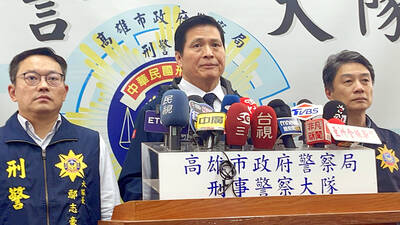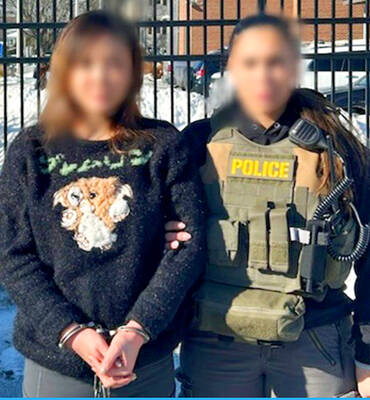To celebrate its 10th anniversary, organizers of Taiwan Lesbian, Gay, Bisexual and Transgender (LGBT) Pride are holding a series of events in the months leading up to the Chinese-speaking world’s largest annual pride parade, which is set to take place on Oct. 27 this year.
A one-month long, cross-island relay started on Saturday in Greater Kaohsiung, with participants carrying a large rainbow flag while marching through the streets.
Members of the LGBT communities and their supporters in different cities and towns are welcome to join the march and also visit important venues and sites relating to homosexual history and culture, organizers said.
Citing a 2010 tragedy in which a teenage lesbian couple committed suicide in Checheng (車城), Pingtung County, one of the relay’s organizers, A-Tuan (阿端), pointed out that even though much progress has been made over the past decade, homosexual youth living in the countryside still lack the support and resources to match their needs.
“Participants of the relay are encouraged to devise their own routes, visit places and share experiences that are important to local LGBT communities or themselves — to make people aware of the LGBT community and possibly gain a more in-depth understanding,” he said.
With more and more small-scale LGBT parades and events recently staged in cities including Taichung, Hualien and Pingtung, the cross-island march is intended to connect LGBT groups and individuals across the country, A-Tuan said.
The rainbow-flag relay will return to Kaohsiung — hosting its third-ever event of this nature — on Sept. 22, with the LGBT Parade set to depart from and then end at the city’s Central Park.
Under this year’s slogan, “Revolutionary Marriage: Equal Marriage Rights and Diverse Partnership” (革命婚姻──婚姻平權,伴侶多元), parade organizers in Taipei hope to use the LGBT communities’ growing power to address the issue of same-sex marriage.
“We are not encouraging people to get married or to naively think that we will live happily ever after,” one of the events organizers Mu Chuan (沐川) said. “Our emphasis is that homosexuals should have the same legal rights as heterosexuals.”
She pointed out that unless same-sex unions are granted with the same legal status as heterosexual marriage, same-sex couples enjoy none of the legal benefits of marriage such as insurance benefits, custody and inheritance rights, as well as the right to visit partners in hospital and to make decisions regarding medical care.
Last month, the Taiwan Alliance to Promote Civil Partnership Rights proposed its version of amendments to the nation’s Civil Law, pushing legislation of civil partnerships, same-sex marriages and opening the right to adoption to gay people and unmarried straight couples.
To further examine the limitations of the marriage system and how LGBT communities may imagine their unions differently, parade organizers are to hold a series of forums, with the first one slated to take place on Saturday at the National Taiwan University Alumni Club. Participating speakers are to include professor Ning Yin-bin (甯應斌) from the National Central University and Wu Shao-wen (吳紹文), general-secretary of the Taiwan LGBT Family Rights Advocacy.
The Taiwan LGBT Pride Community — which organizes the parade — has also called on past participants to submit photographs and other visual documents about previous events. The submitted material will be used for retrospective purposes. More information can be found at www.twpride.org.

Twenty-four Republican members of the US House of Representatives yesterday introduced a concurrent resolution calling on the US government to abolish the “one China” policy and restore formal diplomatic relations with Taiwan. Led by US representatives Tom Tiffany and Scott Perry, the resolution calls for not only re-establishing formal relations, but also urges the US Trade Representative to negotiate a free-trade agreement (FTA) with Taiwan and for US officials to advocate for Taiwan’s full membership in the UN and other international organizations. In a news release announcing the resolution, Tiffany, who represents a Wisconsin district, called the “one China” policy “outdated, counterproductive

ON PAROLE: The 73-year-old suspect has a criminal record of rape committed when he was serving in the military, as well as robbery and theft, police said The Kaohsiung District Court yesterday approved the detention of a 73-year-old man for allegedly murdering three women. The suspect, surnamed Chang (張), was arrested on Wednesday evening in connection with the death of a 71-year-old woman surnamed Chao (趙). The Kaohsiung City Police Department yesterday also unveiled the identities of two other possible victims in the serial killing case, a 75-year-old woman surnamed Huang (黃), the suspect’s sister-in-law, and a 75-year-old woman surnamed Chang (張), who is not related to the suspect. The case came to light when Chao disappeared after taking the suspect back to his residence on Sunday. Police, upon reviewing CCTV

Johanne Liou (劉喬安), a Taiwanese woman who shot to unwanted fame during the Sunflower movement protests in 2014, was arrested in Boston last month amid US President Donald Trump’s crackdown on illegal immigrants, the Criminal Investigation Bureau (CIB) said yesterday. The arrest of Liou was first made public on the official Web site of US Immigration and Customs Enforcement (ICE) on Tuesday. ICE said Liou was apprehended for overstaying her visa. The Boston Field Office’s Enforcement and Removal Operations (ERO) had arrested Liou, a “fugitive, criminal alien wanted for embezzlement, fraud and drug crimes in Taiwan,” ICE said. Liou was taken into custody

TRUMP ERA: The change has sparked speculation on whether it was related to the new US president’s plan to dismiss more than 1,000 Joe Biden-era appointees The US government has declined to comment on a post that indicated the departure of Laura Rosenberger as chair of the American Institute in Taiwan (AIT). Neither the US Department of State nor the AIT has responded to the Central News Agency’s questions on the matter, after Rosenberger was listed as a former chair on the AIT’s official Web site, with her tenure marked as 2023 to this year. US officials have said previously that they usually do not comment on personnel changes within the government. Rosenberger was appointed head of the AIT in 2023, during the administration of former US president Joe